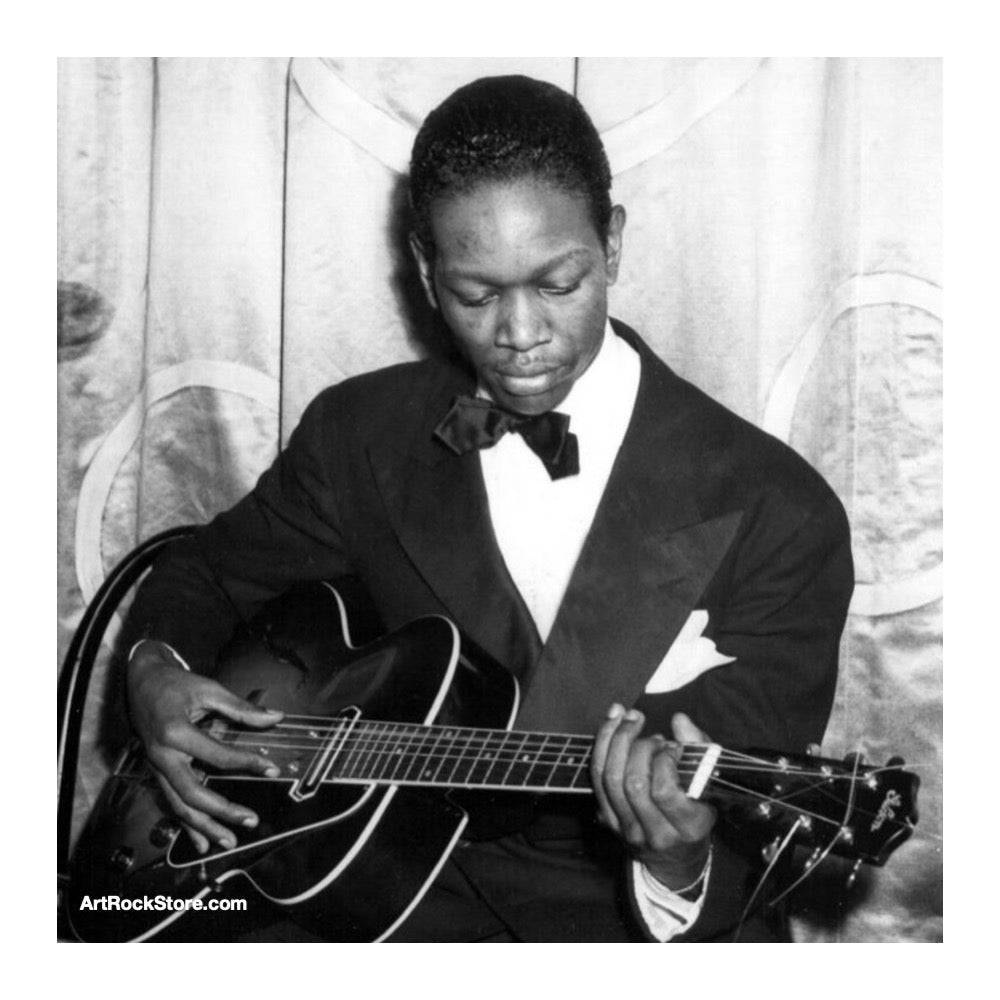
Charlie Christian | Artist
Charles Henry Christian was an American swing and jazz guitarist born 1916 in Bonham Texas. He was among the first electric guitarists and was a key figure in the development of bebop and cool jazz. Christian gained national exposure as a member of the Benny Goodman's groups from August 1939 to June 1941. His single-string technique, combined with amplification, helped bring the guitar out of the rhythm section and into the forefront as a solo instrument. For this, he is often credited with leading to the development of the lead guitar role in musical ensembles and bands. Both his parents were musicians who taught Charlie and his brothers. His father was struck blind by fever, and in order to survive, the family worked as buskers, visiting the better neighborhoods where they performed for cash or goods. When Charles was old enough he entertained by dancing, then learned to play the guitar, inheriting his father's instruments upon his death when Charles was 12. Charlie began jamming with brother Edward's band in the "Deep Deuce" neighbourhood in Oklahoma City. He was performing locally and on the road throughout the Midwest. By 1936 he was playing electric guitar and had become a regional attraction. According to the record producer John Hammond, Christian jammed with many of the big-name performers traveling through Oklahoma City, including Teddy Wilson, Art Tatum, and Mary Lou Williams. In 1939, Christian auditioned for John Hammond, who recommended him to bandleader Benny Goodman, who was only the fourth white bandleader to feature Black musicians in his live band. Goodman's band played that night at Victor Hugo restaurant in Los Angeles. The bandleader called "Rose Room", a tune he assumed Christian did not know. However, Christian knew the tune and took an unprecedented twenty choruses of improvisation; Goodman hired him as a member of the band as a result. In the course of a few days, Christian went from making $2.50 a night to $150 a week. Christian then joined the newly formed Goodman Sextet, which included Lionel Hampton, Fletcher Henderson, Artie Bernstein and Nick Fatool. By February 1940, Christian dominated the jazz and swing guitar polls and was elected to the Metronome All Stars. Christian was an important contributor to the music that became known as bop, or bebop. Some of the players at Minton's Playhouse, an after-hours club in the Hotel Cecil at 210 West 118th Street in Harlem where bebop was born, credit Christian with the name bebop, citing his humming of phrases as origin of the term. On record, Christian was featured on many of Goodman's greatest recordings, as well as on sessions with fellow Bebop players Dizzy Gillespie, Lester Young and Thelonius Monk. Standout albums include archival releases The Genius of the Electric Guitar (1987), After Hours (1957), Together 1940 (1974), and Charlie Christian With Dizzy Gillespie & Thelonius Monk (1957). Tragically Christian died on March 2, 1942, at the age of 25. In the late 1930s he had contracted tuberculosis and was hospitalized. In early 1941, he resumed his hectic lifestyle, heading to Harlem for late-night jam sessions after gigs with the Goodman Sextet and Orchestra in New York. He was admitted to Seaview Hospital, a tuberculosis sanatorium on Staten Island, but never recovered. He was buried in an unmarked grave in Bonham, Texas, under a concrete slab. Christian paved the way for the modern electric guitar sound that was followed by other pioneers, including T-Bone Walker, Eddie Cochran, Scotty Moore, Franny Beecher, B.B. King, Chuck Berry, Carlos Santana and Jimi Hendrix. For this reason Christian was inducted in 1990 into the Rock and Roll Hall of Fame.
Artist Website: wikipedia./Charlie_Christian
Featured Albums: Charlie Christian
Related Artists: Benny Goodman, Dizzy Gillespie, Thelonious Monk
